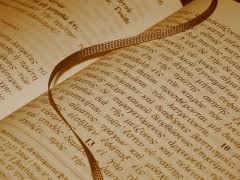"A Sabbath Rest for the People of God" -- Hebrews 4:1-13
 Tuesday, December 17, 2013 at 10:24AM
Tuesday, December 17, 2013 at 10:24AM  The Sixth in a Series on the Epistle to the Hebrews
The Sixth in a Series on the Epistle to the Hebrews
For a tired and weary people, struggling in the face of all kinds of persecution, and yet striving to persevere to the end in faith, nothing sounds better than God’s promise that at the end of the journey, his people will enter his Sabbath rest. But God’s promised Sabbath rest is not merely physical rest from earthly burdens (although this is part of what is in view). Rest from our earthly burdens is merely an illustration of our heavenly rest which extends throughout all eternity. And we enter this rest when we place our trust in Jesus Christ.
As we continue our series on the Book of Hebrews, I hope you are finding this series to be helpful. I encourage you to continue to read through his book on a regular basis in preparation for these sermons. We now move into chapter 4 of this remarkable book, and we will take up the subject of the Christian Sabbath (the Lord’s Day). In this chapter, the author is continuing his discussion begun in the previous chapter when the author quoted the words of Psalm 95 and applied them to the congregation receiving this letter. This section (chapter 3:7-4:13) is part of the author’s case to demonstrate the superiority of Jesus Christ to Moses, and the New Covenant to the old.
Psalm 95 was very familiar to those Hellenistic Jews who became followers of Jesus Christ, and who composed the bulk of the congregation receiving this letter. This particular Psalm, which was read often in the synagogues as a celebration of the arrival of the Sabbath, is divided into two parts. The first part of the Psalm (vv. 1-7a) speaks of the proper worship of YHWH. The second half of the Psalm (vv. 7b-11), recounts Israel’s rebellion against YHWH at Meribah in the wilderness (an event recorded in Exodus 17). Hellenistic Jews understood the account of Israel’s rebellion as the sad story of one of the worst moments in Israel’s history, and something not to be repeated.
The author of Hebrews uses this well-known incident in Israel’s history as a powerful warning that Israel’s rebellion against YHWH was not merely a lesson about the nation’s history–the rebellion at Meribah also serves as a warning to all those in this church who had made profession of faith in Jesus Christ, and were baptized, but who were now considering renouncing Christ and returning to the synagogue as some of their number had already done. To renounce Jesus Christ is to do the same thing the Israelites did in the rebellion at Meribah, only the consequences are far greater because of the greater promises of the New Covenant to those of the Old. To look at this from another angle, rejecting the New Covenant means that much more is forfeited (eternal promises) than even possible under the Old Covenant with its temporal promises and curses.
To read the rest of this sermon, Click Here


Reader Comments